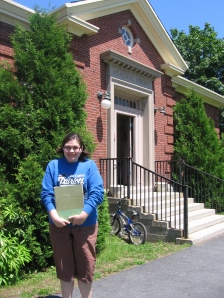Ownership, or possession, changes relationship and meaning. With ownership, appreciation wanes, or at least is diminished, and it is easier for it to wane. Perhaps further: Ownership or possession, without experience otherwise, precludes true appreciation.
Feel free to read this as if Alan Alda were reading it to you. It’s just better that way.
 When I was a little girl growing up in small town Maine, I loved going to the library. The library was tiny, and only open for a few hours on Tuesdays, Thursday, and Saturdays. It was tiny, and they didn’t get new books very often, but I loved the little nooks, and the smells. I loved how the afternoon sun tinted the cloth bindings and woodwork of the shelves, tables and floor and turned the spotlight on the shoals of dust parading through the air. I remember the librarian–kind, gray hair, thick ’80s style metal glasses, open faced. I later learned her name, but I only ever remember thinking of her as “the librarian.”
When I was a little girl growing up in small town Maine, I loved going to the library. The library was tiny, and only open for a few hours on Tuesdays, Thursday, and Saturdays. It was tiny, and they didn’t get new books very often, but I loved the little nooks, and the smells. I loved how the afternoon sun tinted the cloth bindings and woodwork of the shelves, tables and floor and turned the spotlight on the shoals of dust parading through the air. I remember the librarian–kind, gray hair, thick ’80s style metal glasses, open faced. I later learned her name, but I only ever remember thinking of her as “the librarian.”
When I was seven and a half (halves are important when you’re seven), my family moved to this little town and I didn’t like it. Well, I liked somethings about it, but I missed the myriad places you could go, the bigness of where we’d lived (though my world in it was admittedly small). Still, I knew the place we’d left behind had museums and movie theaters and libraries that were open everyday. And Arby’s. And Taco Time. And black people. Rumors that the occasional non-white people who moved into town (often with the coast guard) were usually run off infuriated me. As an eight-year-old, I was pretty sure I’d coined the term, “uni-cultural,” and I applied it to our new town with an air of disdain. I was jealous of my siblings, all about a decade my senior. They had had the option of going to concerts, the mall that was five minutes away, and of having school friends from Hawaii. I was going to miss out.
This little library was a haven for me. It was books and old things and order. It represented knowledge and power and experience–of which I had even less than the little I do now. It fit my desire for public solitude. There was this certain pleasure in being largely undisturbed yet occasionally noticed in this place. Painfully shy, I wanted to become like the people I read about; intelligent, reserved and perhaps somewhat enigmatic–like Phineas Fogg, among others. I didn’t fit into the frenzy that is high school sports in this region (specifically basketball, softball, and baseball, in that order). I recoiled (smugly, yes) at the myriad errors inherent in the spoken dialect that daily accosted my ears.
My favorite book in the entire library was Marvels and Mysteries of Our Animal World, a collection of writings by different authors about animals like passenger pigeons, sea horses and horseshoe crabs. It had a faded green cover, the cloth of which had worn through in some places, and golden text. Scuff marks here and there, and a wonderful old smell. It was a large book, probably a good 14″ in height. A ring on the front left by a cup completed it. The inside cover revealed a simplified, color-coded tree of the animal kingdom. I loved this kind of stuff. I marveled at how horses were related to pigs and how pandas are more related to raccoons than bears.
 I (or one of my parents on my behalf) checked that book out many times. I liked the articles so much I reread some of them. (I’m normally not big on rereading.) I liked how the different authors had different styles of writing. Some were funnier than others, some wrote from the perspective of the animal. Aside from the Bible, this may very well be the first book I read in which the different authorship was really noticeable.
I (or one of my parents on my behalf) checked that book out many times. I liked the articles so much I reread some of them. (I’m normally not big on rereading.) I liked how the different authors had different styles of writing. Some were funnier than others, some wrote from the perspective of the animal. Aside from the Bible, this may very well be the first book I read in which the different authorship was really noticeable.
As I passed from teenager to young adult, and especially as I moved away to the Midwest for college, I wondered about my beloved book. Had it been thrown out or perhaps sold at one of the libraries frequent sales? I asked my parents to please, please look for it anytime they went to a sale.
In more recent years, I’ve pondered my attachment to this old, smelly, unspectacular volume. It wasn’t just a book anymore. It was my childhood. It helped me connect with my previous self. Full on material culture; sort of, at least the memory of the book. This memory had taken on a life of it’s own. My memory isn’t good and I have very few from my pre-teen and teen years. I also wonder why this book and not others? The Count of Monte Cristo, for example, was an early love. Why this one?
In the summer of 2009, I was back in Maine with Ricktopher for our second wedding ceremony. I was showing him around the town and, naturally, we went to the library. The library had changed since I’d last visited. For one thing, they had expanded their hours of operation to include four hours on Wednesdays. An addition on the back with a ramped entrance was new since my last visit, too.

Most of the addition is set aside as a meeting room, which is peculiar since the town has ample meeting space in other locations. This is not true of space for publicly accessible library materials.
The circulation desk was in a new place and more modern. The librarian had been replaced by some younger local woman whom I didn’t know, nor she I. It wasn’t my library anymore. I was merely visiting. I was leading a tour of a building and sharing some stories from its history–what I’d done at historic sites in summers past.
I found my book and showed it to Ricktopher. Yes! It was still there! I showed him the card in the back with the patrons names and due dates. I was way too elated, but I didn’t care. And there I was, again, in the same building, with the same book. Even in the midst of the change, there was the appeal of the sense of grounding and continuity it offered.
Then, there it was, the putting it back and leaving it part. Of course, it was something I could and had every intention of doing. Still there was a part of me that wanted to have the book; to own it. I talked it over with Ricktopher. Should I leave it? Should I offer to pay for it? What if they said, “No”? Would I then just take it anyway? Should I just take it? (By the way, I’m not typically prone to thoughts of theft, but this was what I was thinking.)
We ended up asking if it could be purchased. I tried to sound convincing, I guess afraid that the librarian wouldn’t get the whole material culture aspect of it. For her part, I think she just found it curious that this “away” person would be so interested in a smelly, out dated, stained book on animals. She gave it to me for free.
 For a second I was thrilled. It’s mine! I’ll have it forever. I’ll show it to my kids and grandkids (if I have any). I was happy to have it, and yet, there was something different. The game had changed. My relationship with and how I thought about the book had changed. I owned it now. The not knowing, the “what if I don’t ever get to see it again”s were gone. But so were the cherished chance opportunities to connect. The setting was gone, too. The book wasn’t in a library, out of my control, where I may or may not see it again, but if I did see it, would be in a setting fraught with memories, not all reliant on the book. Now it’s in a box in a neglected corner of a house I don’t even inhabit. (We’re semi-transient.)
For a second I was thrilled. It’s mine! I’ll have it forever. I’ll show it to my kids and grandkids (if I have any). I was happy to have it, and yet, there was something different. The game had changed. My relationship with and how I thought about the book had changed. I owned it now. The not knowing, the “what if I don’t ever get to see it again”s were gone. But so were the cherished chance opportunities to connect. The setting was gone, too. The book wasn’t in a library, out of my control, where I may or may not see it again, but if I did see it, would be in a setting fraught with memories, not all reliant on the book. Now it’s in a box in a neglected corner of a house I don’t even inhabit. (We’re semi-transient.)
The magic, the thrill is gone. I appreciate that I have access to it, that it isn’t lost forever (and possibly, my related memories with it), but something did change.
Ownership, or possession, changes relationship and meaning. With ownership, appreciation wanes, or at least is diminished, and it is easier for it to wane. Perhaps further: Ownership or possession, without experience otherwise, precludes true appreciation.

I really enjoy reading your thoughts, Emily. You made me feel sentimental and emotional (reminiscent and excited) about YOUR experience with the book and library. I easily like to keep items as tangible reminders of memories due to my poor memory, but what you say is true-the having..or not having changes things.
Thanks Heather.
You’re welcome! Miss you. Love you.
Very good writing, deah! Really enjoyed reading it. I wonder if that is the book that they say we still have checked out and is racking up daily fines, lol.
“racking up daily fines”? I hope that’s a joke. Ha, ha. :S
No, it was given to me.